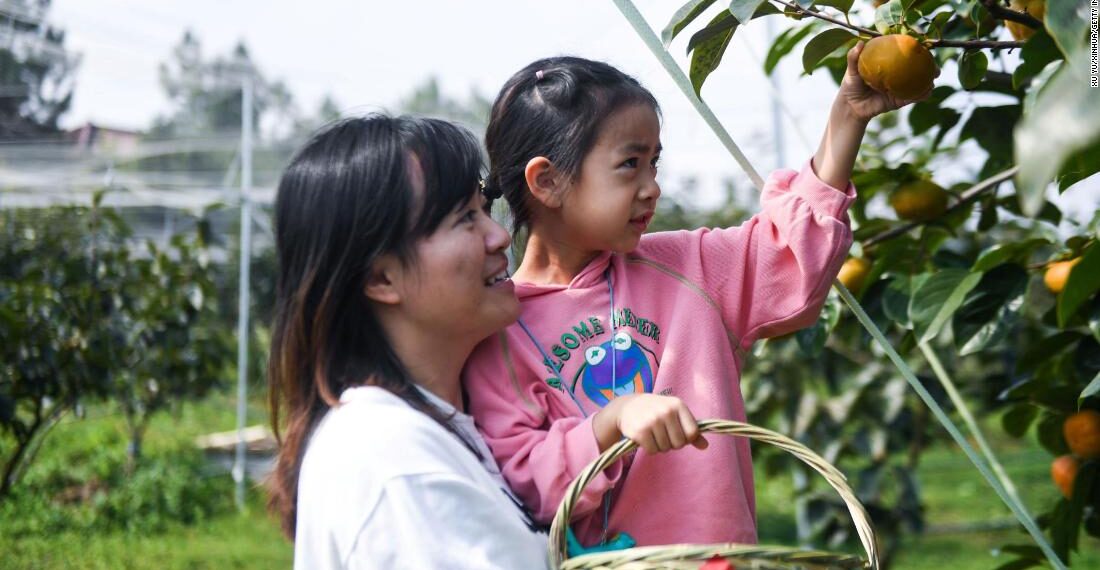And the Chinese language authorities could not be extra happy.
However Chinese language vacationers aren’t simply heading to their nation’s historic and pure wonders — some are on the lookout for one thing a bit completely different.
In posts to Chinese language social media web site Weibo, one consumer named Ancailie mentioned after spending a day selecting mulberries, watching rice develop and consuming home-grown meals she was “a lot happier.”
One other consumer, laozhenyiwen, described how that they had gone to the nation to fish and eat seafood for the latest Could Day vacation, comfortable to have “prevented crowds.”
Chinese language-owned Journey.com Group, one of many world’s largest on-line journey companies, mentioned by March 2021, rural tourism journeys in China had elevated year-on-year by greater than 300%.
The pattern is so profitable that Journey.com is planning a “5 yr motion plan” to advertise rural tourism, which incorporates cultivating 10,000 skilled brokers with a spotlight within the space and investing 1 billion yuan ($150 million) in rural tourism trade funds.
Zhou Mingqi, founder and basic supervisor of Shanghai Tour Information Enterprise Administration Consulting, mentioned Chinese language folks have been getting uninterested in the dearth of leisure alternatives and distinctive experiences within the nation’s massive cities.
“There’s a must expertise a distinct form of life, like idyllic surroundings or countryside life, to alter a life-style on the weekend,” he mentioned.
The straightforward life
Wang Shang works for a Beijing-based firm that helps coordinate countryside excursions and actions. She mentioned that in one of many lodges she labored for, guests can expertise rising their very own meals, observe farming and study in regards to the area’s conventional crafts and customs.
“Most weekend journeys visitors are kindergarten or elementary college college students and their dad and mom,” she mentioned.
Whereas a few of the countryside lodges are fairly elaborate, others may be moderately minimalist, with actions so simple as selecting strawberries, visiting folks museums or attending native operas.
In Wang’s opinion, there are two predominant explanation why folks have been enthusiastic to trip within the countryside — the isolation, and experiencing a wholesome life-style.
One of many lodges Wang labored at, in japanese Shandong province, opened in Could 2020 — simply after the worst of the preliminary Covid-19 epidemic in China — and it was rapidly stuffed by folks seeking to vacation within the relative security of the countryside, she mentioned.
“The inhabitants density of rural areas is low, and virus prevention and management have been achieved nicely. So many city households select to go (there),” she mentioned.
Wang mentioned guests from massive cities come to purchase flour, noodles, meat, eggs, honey and liquor, amongst different gadgets. “For every parent-child journey, we’ll organize selecting or planting actions in order that kids can study in regards to the crops. Mother and father are additionally very keen to take their kids to play within the mud,” Wang mentioned.
“The visitors go into the village to drink soy milk, watch the piggies within the pigsty and so forth. Friends like these actions.”
In a single video, Li crops seeds to develop soy beans after which make soy sauce. In one other, she picks peaches and berries to make jam, creating it naturally with none meals components.
However regardless of the looks of an genuine nation expertise, Zhou mentioned {that a} rising quantity of rural lodges and villages have been making an attempt to draw guests.
Some rural areas have been even partaking skilled organizations to attempt to enhance their enchantment, Zhou mentioned, planning and design specialists who concentrate on bringing in vacationers.
“These days, the agricultural areas in lots of locations have certainly undergone main modifications. Particularly after renovating for tourism, it can grow to be rather more stunning than prior to now, as a result of the agricultural areas prior to now had no planning and no design. Farmers simply constructed homes,” he mentioned.
Poverty alleviation
The fast progress in rural tourism is not simply the results of the pandemic or fast urbanization in China. It is also a significant authorities coverage.
Beneath President Xi Jinping, the Chinese language authorities has been trying to revitalize rural areas and assist poor residents within the countryside by way of a program of poverty alleviation.
However not each funding has been a hit. With giant quantities of cash on provide and targets to be hit, Shanghai’s Zhou mentioned that some initiatives — particularly in distant areas which can be laborious to entry — had but to see a return on funding.
“I’ve seen locations investing tens of hundreds of thousands however did not carry many vacationers,” he mentioned.
What to anticipate sooner or later
Wang, from the tourism firm, mentioned she believed rural sightseeing was solely simply starting to take off and sooner or later, it will focus extra on China’s myriad of native cultures.
“Trying on the agricultural and rural growth insurance policies lately, I believe that rural areas have a lot of potential,” she mentioned.
“For countryside lodges, I believe there will likely be extra tourism merchandise with content material based mostly on native tradition sooner or later, that are in-depth cultural excursions.”
The nationwide authorities does not look like backing down on its promotion of rural tourism. In a draft of the Chinese language Communist Celebration’s 14th 5 Yr plan, which can run from 2021 till 2025, the federal government known as for additional strengthening of “leisure agriculture, rural tourism and the homestay economic system.”
Zhou, from Shanghai Tour Information Enterprise Administration Consulting Firm, mentioned with rural tourism being supported each by authorities insurance policies and buyer demand, the long run was brilliant.
“I’m undoubtedly optimistic in regards to the total prospects,” he mentioned.
Supply: www.cnn.com



